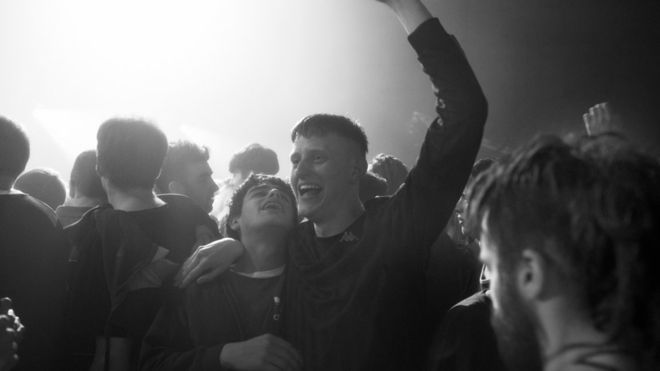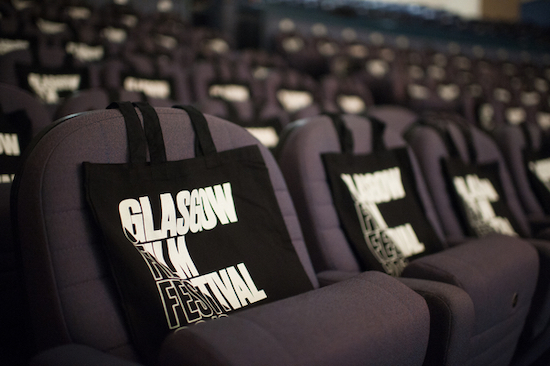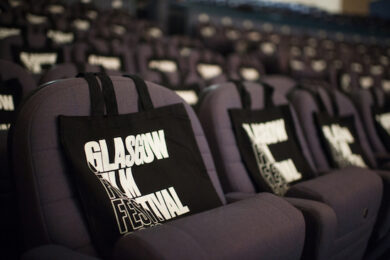The city of Glasgow is ideally sized for a film festival; you can immerse yourself in the headlong festival rush of hopping from screening to screening almost entirely on foot. The gregarious intensity of the city only adds to the occasion, generating an unusually relaxed festival atmosphere, albeit one punctuated by cinematic snapshots of the recent past – nineties rave culture, eighties papier-maché cult heroes and seventies Hollywood subversion – muscling up to new and left-field talents from the present day. This generous and open approach to film programming gives Glasgow Film Festival currency within a ludicrously over crowded and over curated festival circuit. There are little distractions on offer here other than watching films – a noble and archaic achievement.
But let’s begin with the present and specifically, Beatrice Gibson’s I Hope I’m Loud When I’m Dead. A Glasgow Film Festival alumnus, Gibson’s film is a raucous and beautiful celebration of community-led empathy, deploying poetry – primarily CAConrad and Eileen Myles but also Adrienne Rich, Audre Lorde and Notley – as a method of navigating our troubled and anxious era. Much of the material in the film was recorded on the eve of the 45th presidential inauguration in January 2017 and is shot through with reflections on privilege, our relationship with power and our complicity in both. If we feel discombobulated by the film’s political interruptions, we find remarkable solace by the end as we witness Gibson and her young son lost in blissful reverie on a dance floor to Corona’s ‘The Rhythm of the Night’ – a reference to Denis Lavant’s character Galoup’s similar ecstatic revelations at the end of Claire Denis’s Beau Travail – which serves as a triumph of empathy over onerous power.
Perhaps the most curious film I encountered at Glasgow Film Festival was Niall McCann’s The Science of Ghosts. Ostensibly a portrait of Galway musician Adrian Crowley, the film is extraordinarily slippy as Crowley appears to largely play an improvised version of himself in the film albeit one with a spectral presence even when he is present on screen. McCann is a very skilled and artful director – check out Art Will Save The World, his wonderfully pithy portrait of Luke Haines from a few years back – and one wonders whether The Science of Ghosts is best viewed as a tentatively profound expounding of cinema as a means of multiplying time and memory – aka ‘ghosts’ – and, in this respect, the film very much exists within the lineage of Ken McMullen’s unabashedly non-linear Ghost Dance (a still from which we see in McCann’s film).
During the course of an impassioned q&a after the film, the director eloquently related the constant practical difficulties in getting a film made, the bureaucratic bottlenecks which one has to overcome to make any of these ideas, or ghosts, a filmic reality and perhaps the kernel of the film lies within this struggle, this exposing of the uncertainties – existential or fiscal or otherwise – in electing to grapple with both science and spectres.
In some respects, the most revelatory aspect of Glasgow Film Festival was the retrospective afforded to writer, director, actor, comedian and producer Elaine May. Each morning, the festival screened a film directed by May, revealing her wonderfully unique authorial voice, at once ingenious and daring and hysterically funny. Of course, her 1987 film Ishtar is routinely dismissed as one of the most ostentatious flops of our time, but playing this film in the middle of her retrospective revealed an entirely fresh perspective on this hugely-maligned work and one which, according to festival co-director Allan Hunter, ensured she never directed in Hollywood again.

Beats (2019)
May’s most critically and successful film, The Heartbreak Kid from 1972, is an unequivocal masterpiece of bitter, nebbish comedy featuring an unpleasant social climber named Lenny (superbly played by Charles Grodin), who becomes instantly irritated by his gauche bride Lila (played by Jeannie Berlin, May’s real-life daughter) and repeatedly attempts to jettison her once he encounters the provocative – and extraordinarily wealthy – charms of daddy’s girl Kelly, (played by Cybill Shepherd). What makes this so utterly compelling is May’s ultra sharp character study, particularly of Lenny, which is steeped in miniature observations of his movements, his gestures, peaking in a magnificently understated final scene, one that is light years away from the over-cooked denouement offered in Ben Stiller’s 2007 remake.
May followed this with Mikey and Nicky, a devastatingly intense account of the near psychotic relationship between John Cassavetes’ petty criminal and his old friend, played by Peter Falk. The troubled gestation of this film, however, had nothing on the maddening production of Ishtar, a film which still doesn’t quite work in its own right – the jokes are simplistic and too easily signposted, the plot is heavy handed and tedious to plough through – but, on viewing this as part of a comprehensive retrospective, this is merely due to the bar being set so high by May’s magnificent earlier works rather than being reflective of an outright cinematic disaster.
The festival closed with Brian Welsh’s Beats, a paean to early nineties rave culture and to a Britain on the cusp of Britpop and Cool Britannia but still very much in thrall to the legacies of Thatcher’s rule. The film utilises the 1994 Criminal Justice and Public Order Bill – outlawing music events “wholly or predominantly characterised by the emission of a succession of repetitive beats” – as the emblem of oppression which techno aficionado Jonno and his unpredictable best pal Spanner rail against in their impoverished West Lothian town. While the film appears to inch towards a death knell for both Jonno and Spanner’s friendship and the underground culture they celebrate, a quite beautiful crescendo is reached through the extended, revelatory set piece which erupts once our heroes drop Ecstasy together for the first time.
It’s difficult to over-estimate the staggering rush of euphoria – perhaps the contrast to the relatively standard set-up is key – which floods the screen through liquid visuals from Weirdcore and sudden splurges of colour interrupting the hitherto controlled black and white cinematography. This alone makes the film a triumph but there is a complexity beyond the drug rush; the relationship between Jonno and Spanner cries out for queer interpretations and as a cultural history of the recent past, Beats was a magnificent send-off to a cultural moment and to a wonderfully calibrated programme of film in Glasgow.
Glasgow Film Festival returns to the city from 26 February to 8 March 2020



